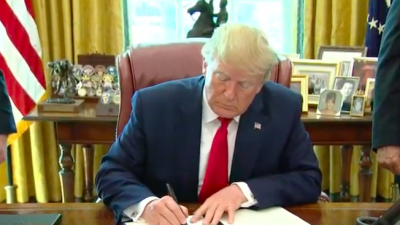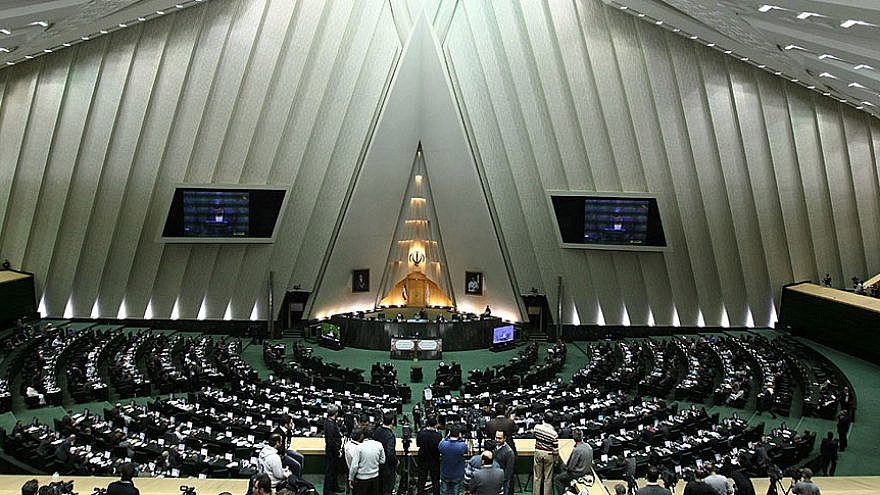It’s not every day that the head of the Mossad gives a public address, so when he does, people listen. His remarks come on the heels of Iran having officially breached the limit of its enriched uranium stockpile set in the 2015 deal and just hours after Israel reportedly struck several targets across Syria, including the capital of Damascus and the central city of Homs, killing at least 15 people.
Speaking at the annual Herzliya Conference, Mossad director Yossi Cohen offered his professional assessment that Iran is to blame for much of the region’s troubles. Referring to the attack on two Saudi oil tankers in the Persian Gulf, he said, “The debate over who is responsible for the attack is vital, and I can tell you with certainty, from the best Israeli and Western sources, that Iran is definitely behind these attacks.”
He further warned of the dangers of complacency in facing Iran.
“Through these attacks, Iran is trying to say to the world—a world that is afraid of escalation—that if the sanctions are not lifted, it will cause serious damage to the world oil economy,” said Cohen. “This is an irresponsible Iranian policy that could ignite a fire in the region.”
“Can Israel trust the world?”
Israeli Prime Minister Benjamin Netanyahu urged European countries to stand by their word and take action over Iran’s announcement that it violated its limit on nuclear enrichment, which was confirmed by the International Atomic Energy Agency. “On this day, I also call on all European countries to stand behind their commitments. You committed to act the moment Iran violates the nuclear agreement, you committed to activate the mechanism for automatic sanctions that was set in the [U.N.] Security Council,” he said. “Do it. Just do it.”
‘Set the table for negotiations’
At the conference, in a panel titled “Putting the genie back in the bottle” and moderated by Israeli journalist Ronen Bergman, experts weighed in on the nature of the conflict between Iran and Israel, and where it may be heading.
Mark Dubowitz, CEO of the Foundation for Defense of Democracies, supported the Trump administration’s policy to use all instruments of American power against the Iranian regime.
“The maximum pressure campaign is working,” he said. “It’s always good to weaken your enemy—not strengthen them.”
“Do we want to confront a weakened Iran or a stronger Iran?” he asked rhetorically. “Confrontation with this regime is inevitable. Indeed, they have been confronting the U.S. for 40 years, and we have been doing very little in response.”

In terms of where the United States and Iran are heading on the diplomatic track, he said, “we are heading toward, at least in the short term, a negotiation. The Iranians know they won’t win a military conflict with the United States, so they are starting to set the table for negotiations by increasing their own leverage. If they believe [U.S. President] Donald Trump is going to be re-elected, and that’s a big if, they are going to want to trap this president in negotiations the way they’ve trapped previous presidents in negotiations because they think they can win.”
Jean-David Levitte, former senior adviser to former French President Nicolas Sarkozy, said Iran is in a weak position and wants to demonstrate its capability to do harm. Levitte said his understanding is that Iran wants to negotiate. “Our duty is to help bring the negotiations back on track and maybe bring the JCPOA [Joint Comprehensive Plan of Action, or 2015 nuclear deal] back on track.”
Sima Shine, a senior research fellow in the Institute for National Security Studies and former deputy director general of Israel’s Ministry of Strategic Affairs, responsible, inter alia, for the Iranian file, said she agrees that “at the end of the day, both sides will reach a new agreement. I do not think it will happen in the near future since the Iranians do not trust Trump.”
She expressed concern that there is no “Plan B” if the pressure doesn’t work: “I think this is the main problem with the current situation. There is no good Plan B.”
‘There is no way to go back to the JCPOA’
Ariel Levite, nonresident senior associate in the Nonproliferation Program at the Carnegie Endowment for International Peace and former principal deputy director general of the Israeli Atomic Energy Commission, said the JCPOA is not what people thought it was. People have in their minds “some kind of deal that was reached in 2015. The JCPOA is far less perfect than that.”
“Most importantly,” he added, “there is no way to go back to the JCPOA. That being said, the JPOA—the diplomatic agreement that paved the way for the JCPOA—is a list of principles which could and should be the basis of future negotiations.”
Levite noted that “there is no strategy for escalation, and there is no strategy for negotiations.”
“I think this is the main problem with the current situation. There is no good Plan B.”
He pointed to the Oslo process as proof that everyone thought that it would “generate positive dynamics. It did not,” he insisted. “There was an illusion that the JCPOA would pave the way for positive dynamics with Iran. It has done exactly the opposite.”
Levite said the limitations of the JCPOA, together with the negative dynamics, create the need to go back to the basics. “In the haste to get an agreement in 2015, very serious shortcuts were made, which ultimately produced a very problematic agreement and a very flawed implementation of it thereafter,” he said.
Bergman asked fellow participant Maj. Gen. (res.) Yaakov Amidror, former security adviser to Netanyahu, whether Israel should prepare for a strike on Iran.
Amidror replied, “The clear answer, ‘yes.’ Israel cannot be in a situation in which Iranians will absorb the ability to manufacture nuclear military capability, and Israel cannot stop it.”
He complained that the world has given a free pass to Iran and failed to prevent the Iranians from importing and building 130,000 rockets in Lebanon. He also fumed that the world “is so anxious to stop the Americans today,” but has done nothing to stop Iran from acting on its threats to annihilate Israel.
Amidror also insisted that Iran wants to build a barrier in Syria that Israel will face when it comes to the decision of how to stop the Iranian military nuclear program, and emphasized the importance of Israel relying only on itself to guarantee its security.
“We cannot put our future in the hands of any other state. ‘Israel defends itself by itself’ is not just a slogan. It is something that we should pay for,” he said. “At the end of the day, if the Iranians cross the red line and we are in a situation in which tomorrow will be too late, we will have to act.”

Amidror said Israel must focus on two issues: One is to contain the Iranians and not let them build forward bases in Syria; the other is to prepare the Israeli Air Force to bomb Iran, saying “we should not let any other issues to disturb us or stop us from preparing ourselves for this critical day that might come.”
Shine disagreed with Amidror that Israel must be prepared to contain Iran by itself, insisting that it’s a global problem. “The international community should deal with it. I don’t think Israel can take upon itself the solution,” he said.
“But can Israel trust the world?” Bergman asked.
Amidror stressed that if the world doesn’t act to neutralize the Iranians, the question is what Israel intends to do. “What do we do if they don’t? The answer to that question should be very clear. We should not let Iran go nuclear.”
He added that “for decision-makers, it is not an academic argument over who is better to do it. The question is if they don’t. Israel should be in the position to do the job. … Israel should prepare itself for the situation if all the good people in the world will not do it. … We should do it.”
‘Iranians want to wait out Trump’
Levite said Israel needs a four-prong strategy to confront Iran, including economic pressure, pushback against Iranian belligerence in the region, an Israeli strategy to confront Iran if it escalates on the nuclear front or regional aggression, and finally, Israel must be prepared to negotiate and, if necessary and after having exhausted the option of diplomacy, escalate militarily.
“What do we want to accomplish in the negotiations?” he asked. “That is where the Obama administration, in the late stage of the negotiations, lost its marbles. They actually were so eager to get the deal that when moving from the JPOA, which they negotiated skillfully, to the JCPOA, they made a lot of concessions, and they made further concessions after the agreement was concluded!”
But if Iran does obtain nuclear weapons, can Israel depend on mutual deterrence?
Levite said, “Israel should do everything it can to prevent Iran from acquiring nuclear weapons, even if it means operating alone.”
“What do we want to accomplish in the negotiations?”
“We won’t give Iran the pleasure to believe that by having nuclear weapons, they can eliminate Israel,” he said.
He noted that Iran already appears comfortable with acting aggressive and confrontational—and that’s without a nuclear umbrella. Imagine what they would do if they have the nuclear umbrella, he posed.
In assessing the near future, each panelist offered their prediction.
“The Iranians want to wait out Trump,” stated Dubowitz.
He said they are watching the Democratic debates “very carefully” and will take small, incremental escalatory steps to avoid any major American or European response. “They are building up negotiating leverage,” he said, while hoping that the Democrats will undermine Trump politically and defeat him. This way, Iran gets a better deal, receives sanctions relief and the nuclear restrictions “start to sunset.”
Said Amidror: “It depends on the Iranians. In the long run, I do not know.”
Levite predicted that a breakthrough with North Korea could influence the Iranians to negotiate with Trump, saying “if they see he walked down a fair amount, they will actually negotiate.”

























